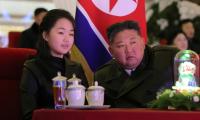Intellectuals must strive to decolonise knowledge, conference told
Intellectuals must struggle to decolonise knowledge by not taking progress and civilisation at face value but by telling more multiple and messy stories that co-constitute the story of the modern state, Dr Suren Pillay told a conference on Saturday.
Dr Pillay, who is associate professor at the Centre for Humanities Research in South Africa’s University of the Western Cape, was addressing the Habib University’s third Postcolonial Higher Education Conference.
The conference highlights the specific historical and educational challenges of the postcolonial world. This year’s theme dealt with ‘The Inheritance of Injustice’, bringing top global academics from South Asia, Africa, the US and the UK to address the conference.
In his keynote speech, Dr Mwangi wa Githinji addressed the question of a just postcolonial development. Associate professor of economics at the University of Massachusetts Amherst in the US, Dr Githinji explored the ways in which inherited economic, social, language and ecological structures transmitted colonial injustice into the present.
He highlighted how the transmission of injustice and the structure of the economy led to the failure to improve the well-being of the vast majority of the population.
He pointed out that today development was still understood in a deficit model based on dualities with the aim to move countries to be more like the modern and industrialised world. He called for development as constantly expanding along multiple vectors that required radical inclusion.
Education systems also need to break out of their postcolonial inheritance to indigenising systems in which language is a library of ideas that allows us to create our own histories, he said.
After the keynote address, the conference was structured into three panels: the first ‘Imagining a Post-colonial Politics’, the second ‘Confronting a Fractured Past’ and the third ‘Revisiting Emancipatory Futures’.
The first panel broadly engaged with the question of political imagination as outlined in the 18th century European thought and as practiced in contemporary societies.
Speaking from his pedagogical experience in South Africa, Dr Pillay offered an alternate, less Eurocentric way of the genealogy of the modern state in Africa.
He stressed that intellectuals must struggle to decolonise knowledge by not taking progress and civilisation at face value but by telling more multiple and messy stories that co-constitute the story of the modern state.
Dr Peter Hallward, professor of modern European philosophy at the Kingston University in the UK, explored the nature and value of popular sovereignty. His talk looked at several ways past injustices cast a shadow over political self-determination in the present. He paid particular attention to the role of popular will as a productive force in the sovereign state.
The second panel brought two well-known academic-novelists, Dr Minoli Salgado and Dr Sabyn Javeri, in conversation with Dr Asif Farrukhi to speak of their creative work as a symbol of political resistance.
Dr Minoli’s novel ‘A Little Dust on the Eyes’ reflects on the conditions of civil war and the traces left of terror and trauma on people in Sri Lanka: “Writing is a way of bearing witness of the past.... Self-censorship destroys from within.”
Dr Sabyn’s novel ‘Nobody Killed Her’ addresses varied struggles of women’s empowerment within patriarchal and class-based societal structures. She also touched upon the issues of teaching feminist fiction in a postcolonial context.
The third panel highlighted alternate economic visions needed to improve life of economically marginalised people. Dr Craig Phelan, professor of comparative liberal studies and interim dean of arts, humanities and social sciences at the Habib University, explored the role of trade unions in the struggle for labour rights.
“Unless African trade unions are prepared to shed their European notions of what the working class is and adopt a postcolonial vision that more accurately reflects economic circumstances, one of the most progressive forces on the continent will soon wither and disappear.”
Expanding the dialogue further, well-known academic-activists Dr Shahram Azhar and Ammar Jan challenged dominant discourse of labelling Marxism as a Eurocentric ideology, saying that they problematised the intellectual history of Marxism that looked at the rest of the world with Western-tinted spectacles of progress and modernity.
Dr Azhar proposed that progressive political visions of South Asia had to start talking about the economic system of capitalism that kept perpetuating the injustices left by inherited systems and thought.
The conference concluded with the noted Sindhi Sufi poet Shah Abdul Latif Bhittai’s message of universal love. Renowned national performer Fakir Juman Shah and choir took the audience on a soulful journey by performing ‘Shah Jo Raag’.
-
 From Aspirin To Cream: White House Links President Trump’s Neck Rash To ‘preventative’ Skin Treatment
From Aspirin To Cream: White House Links President Trump’s Neck Rash To ‘preventative’ Skin Treatment -
 ChatGPT Or ‘QuitGPT’? OpenAI’s App Uninstall Rate Jumps 295 Percent After Pentagon Deal
ChatGPT Or ‘QuitGPT’? OpenAI’s App Uninstall Rate Jumps 295 Percent After Pentagon Deal -
 Angelina Jolie, Louis Garrel's Relationship Status Finally Revealed
Angelina Jolie, Louis Garrel's Relationship Status Finally Revealed -
 Royal Family Vs Taxpayers: Andrew’s Donation To Virginia Giuffre’s Charity As MP Questions
Royal Family Vs Taxpayers: Andrew’s Donation To Virginia Giuffre’s Charity As MP Questions -
 OpenAI’s Sam Altman Calls Pentagon Deal ‘opportunistic And Sloppy’ Amid Backlash; Seeks Further Amendments
OpenAI’s Sam Altman Calls Pentagon Deal ‘opportunistic And Sloppy’ Amid Backlash; Seeks Further Amendments -
 Claude Still Down? Latest Updates On Outage
Claude Still Down? Latest Updates On Outage -
 Watch: Nancy Guthrie's Suspect Break His Silence After Being Dubbed Masked Kidnapper
Watch: Nancy Guthrie's Suspect Break His Silence After Being Dubbed Masked Kidnapper -
 British Columbia Daylight Saving Ends As Province Adopts Permanent Time
British Columbia Daylight Saving Ends As Province Adopts Permanent Time -
 'Deadliest Catch' Star Dies In Tragic Incident At 25
'Deadliest Catch' Star Dies In Tragic Incident At 25 -
 Kawhi Leonard Earns All-NBA Praise From Zach Lowe After Clippers Turnaround
Kawhi Leonard Earns All-NBA Praise From Zach Lowe After Clippers Turnaround -
 Nuggets Vs Jazz: Jamal Murray’s 45 Points Power Denver Past Utah
Nuggets Vs Jazz: Jamal Murray’s 45 Points Power Denver Past Utah -
 Justin Timberlake Moves To Block Release Of Body Cam Footage From DWI Arrest
Justin Timberlake Moves To Block Release Of Body Cam Footage From DWI Arrest -
 Kim Jong Un’s Future Under Speculation: Could His Daughter Lead North Korea?
Kim Jong Un’s Future Under Speculation: Could His Daughter Lead North Korea? -
 Nancy Mace Under Investigation By House Ethics Panel For Alleged Overcharges
Nancy Mace Under Investigation By House Ethics Panel For Alleged Overcharges -
 'Sinners' Star Jayme Lawson Calls Out BAFTA Organisers For Exploiting Tourette's Advocate
'Sinners' Star Jayme Lawson Calls Out BAFTA Organisers For Exploiting Tourette's Advocate -
 Lauren Boebert Gets Yelled At By Hillary Clinton Over Leaked Photo During Epstein Deposition
Lauren Boebert Gets Yelled At By Hillary Clinton Over Leaked Photo During Epstein Deposition



